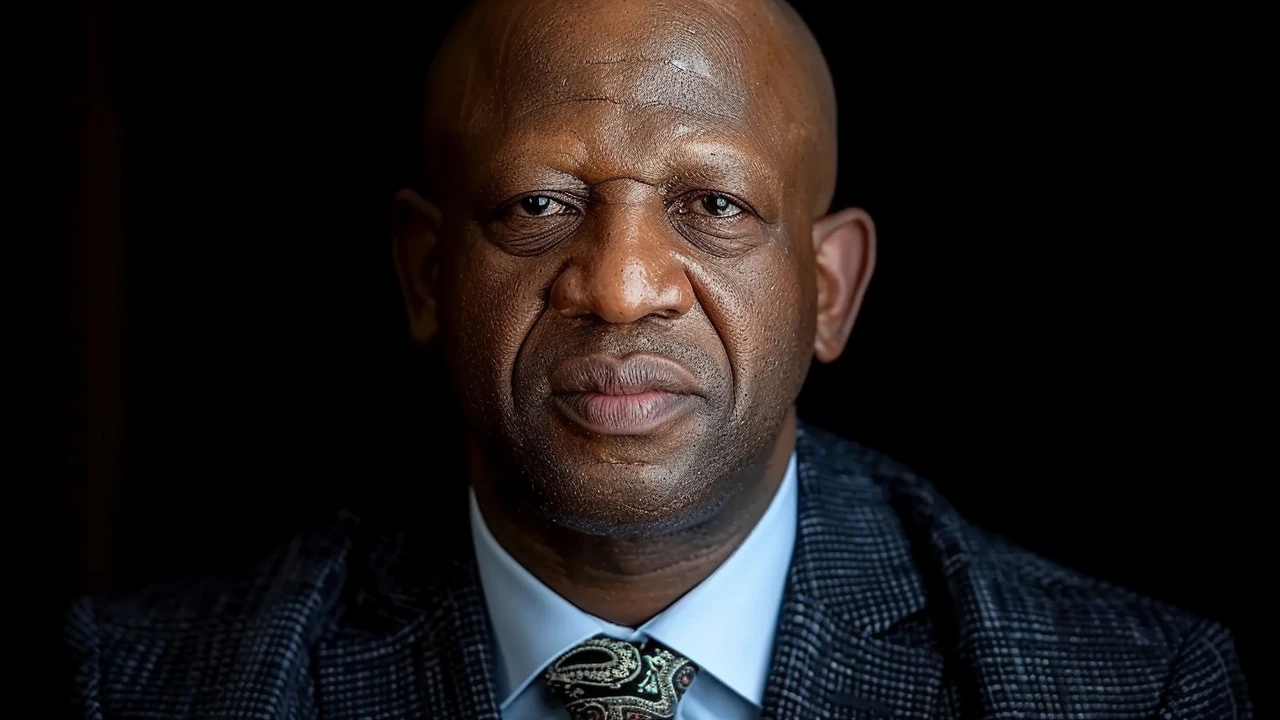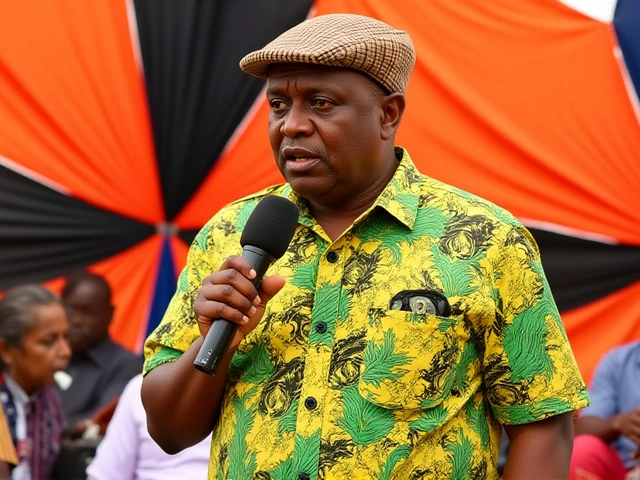KZN Premier Thami Ntuli Unveils Diverse 10-Member GNU Executive Council
On a momentous Tuesday, KwaZulu-Natal Premier Thami Ntuli announced the much-anticipated list of the 10-member executive council for the province's government of national unity (GNU). This key event is set to steer the province towards a new direction, emphasizing cooperation and collective governance. As the GNU takes shape, voters are eagerly looking forward to how this collaborative council will impact their lives.
The executive council is a potpourri of political parties, meticulously divided based on their share of the vote in the recent elections. The Inkatha Freedom Party (IFP), which secured 18% of the vote, is prominent in this assembly, leading four significant portfolios: leader of government business, cooperative governance and traditional affairs (Cogta), agriculture, and sports. With such a substantial influence, the IFP is poised to bring about changes in these pivotal sectors that affect everyday life for the citizens.
Following closely is the African National Congress (ANC), which garnered 16% of the vote. Tasked with leading the health, education, transport, and human settlements portfolios, the ANC’s responsibilities are immense. Health and education are particularly critical areas that require continuous improvements. Transportation infrastructure also remains a priority, as well as effective housing policies to improve residents' quality of life.
Standing as another major player, the Democratic Alliance (DA) with its 14% vote share will oversee finance and public works. These portfolios are fundamental to the province's economic stability and development. The DA's role in managing the province's budget and infrastructure projects will be scrutinized closely, as balanced finances and robust infrastructure are keys to long-term prosperity.
Meanwhile, the National Freedom Party (NFP), despite securing only 1% of the vote, has been entrusted with the social development portfolio, a testament to the inclusive nature of the GNU. Social development plays an indispensable role in addressing the socio-economic challenges faced by the most vulnerable populations. The NFP’s contribution in social services, welfare programs, and community development will be essential in bridging the gap between the affluent and the underprivileged.

Coalition Government at Work
The distribution of these portfolios follows a meticulously crafted coalition agreement between the parties. This coalition is a prime example of power-sharing and political partnerships aimed at fostering a more inclusive and representative governance model. The allocation of portfolios, which saw the IFP receiving the most MECs (Members of the Executive Council) with four, the ANC three, the DA two, and the NFP one, reflects the diverse political representation in the government.
This announcement has drawn reactions from various quarters. Supporters of the coalition highlight the benefits of such an alliance, pointing out that it could lead to more balanced and transparent governance. Detractors, however, express concerns regarding potential conflicts and inefficiencies that might arise from such a diverse executive council.
Political analysts argue that the success of this coalition government will depend heavily on the spirit of cooperation and mutual understanding among these different factions. The ability and willingness of each party to prioritize provincial development over partisan interests will be crucial for the council’s effectiveness.
Challenges and Expectations
As the newly formed executive council begins its work, several challenges await. The health sector is in need of urgent attention, given the strain from recent global health crises. Education requires reforms and investments to ensure quality learning for all students. Improved transport infrastructure is necessary for economic activities and mobility.
Agriculture, a sector led by the IFP, is crucial for the province’s economy, requiring innovations and support to enhance productivity and food security. In sports, fostering youth talent and preparing for national and international competitions will be a focal point.
The Cogta department, another key area under the IFP, will play a vital role in fostering cooperative governance and supporting traditional leadership structures. The economic portfolios led by the DA will need prudent budget management and the execution of vital public works projects.
On the human settlements front, the ANC aims to deliver sustainable housing solutions and address urbanization challenges. In social development, the NFP’s role will be crucial in enhancing social welfare programs to cater to the needs of the underprivileged, while ensuring effective community development initiatives.

A New Chapter for KwaZulu-Natal
The formation of this government of national unity is being seen as a new chapter for KwaZulu-Natal, one that emphasizes collaborative governance and inclusive policies. Premier Thami Ntuli's announcement is more than just the unveiling of a new executive council; it is a call for synergy among political leaders to act in the best interest of the province.
As the executive council takes its responsibilities, the provincial citizens are keenly observing the developments. The success of this council could set a precedent for similar coalition models in other regions, highlighting the power of unity in diversity.
The spotlight is now on the newly-appointed members of this executive council. Their ability to navigate the complexities of governance while fostering cooperation and delivering results will be critical in defining the success of this coalition government. For the people of KwaZulu-Natal, the hope is that this diverse team will rise above political divides and work towards real progress and development.






Hina Tiwari
June 18, 2024 AT 17:51Wow, reading about this new GNU council really hits home – it feels like a breath of hope for the people of KZN. The way the IFP and ANC are sharing key portfolios could bring real change if they truly work together. Let’s hope the collaboration doesn’t get lost in bureaucracy, otherwise all this effort could be for naught. It’s a big step for teh province.
WILL WILLIAMS
June 26, 2024 AT 17:31Colorful coalition vibes! This power‑mix could light up KZN like fireworks.
Barry Hall
July 4, 2024 AT 17:11Respect the effort, let’s see it deliver 🟢.
abi rama
July 12, 2024 AT 16:51It’s refreshing to see parties putting aside rivalry for the greater good. When the IFP pushes agriculture forward and the DA keeps the books straight, everyday folks can finally feel the impact. Collaboration like this can spark new projects and job growth. I’m optimistic the council will keep the momentum alive.
Megan Riley
July 20, 2024 AT 16:31Congratulations to all the members!!! This is a huge step forward,,, and we all deserve to celebrate---the diversity of this council is truly inspiring!!! Keep pushing forward, and remember, consistent effort beats occasional brilliance!!!
Lester Focke
July 28, 2024 AT 16:11One must acknowledge the theoretical underpinnings of such a coalition, whereby proportional representation aligns with normative democratic principles. The allocation of portfolios exhibits a calculated equilibrium, yet the operative efficacy remains contingent upon inter‑party synergies.
Naveen Kumar Lokanatha
August 5, 2024 AT 15:51The formation of this executive council represents an inclusive step toward governance that reflects the electorate's diverse preferences. While the lack of punctuation may seem minor it underscores the need for clear communication in policy implementation
Alastair Moreton
August 13, 2024 AT 15:31Oh great, another coalition promising miracles. Let’s just wait for the inevitable infighting and blame‑shifting that always follows.
Surya Shrestha
August 21, 2024 AT 15:11Indeed, the theoretical elegance of a power‑sharing arrangement is admirable; however, practical execution often diverges from scholarly expectations, thereby necessitating vigilant oversight; otherwise, the coalition risks devolving into bureaucratic stagnation.
Rahul kumar
August 29, 2024 AT 14:51Look guys this council can actually make a difference if they focus on health and education first its gotta be top priority for the people
mary oconnell
September 6, 2024 AT 14:31From a meta‑analytical perspective, the emergent governance model serves as a case study in polycentric coordination, albeit with a palpable dose of performative inclusivity that borders on the theatrical.
Michael Laffitte
September 14, 2024 AT 14:11Wow, that hits the nail on the head! If they truly collaborate, we might actually see the "dramatic turnaround" they promise.
sahil jain
September 22, 2024 AT 13:51Let’s keep the momentum high and watch these portfolios transform the province 🌟.
Bruce Moncrieff
September 30, 2024 AT 13:31I’m curious how they’ll tackle the transport bottlenecks especially in rural zones the solution will need bold investment and community input
Dee Boyd
October 8, 2024 AT 13:11It is morally imperative that this coalition prioritizes equitable resource distribution over partisan gain; any deviation would constitute a betrayal of public trust.
Carol Wild
October 16, 2024 AT 12:51The sheer audacity of declaring a "government of national unity" while simultaneously allowing the same entrenched interests to dictate policy is, in my view, nothing short of a grand charade. One must wonder whether the real agenda lies not in serving the populace but in preserving the power structures that have long dominated KwaZulu‑Natal. Behind the glossy press releases, there are whispers of back‑room deals that favor the elite, ensuring that budget allocations continue to line the pockets of a privileged few. The IFP’s dominance over agriculture, for instance, raises suspicions that subsidies will be funneled to loyalists rather than to struggling smallholder farmers. Meanwhile, the ANC’s control of health and education could be a convenient veil for perpetuating patronage networks. The DA, tasked with finance, may find itself constrained by directives that prioritize political optics over fiscal prudence. And let us not overlook the NFP’s token presence in social development, which could simply be a façade to appease minority demands while real resources are siphoned elsewhere. Some analysts argue that such coalitions are engineered to dilute accountability, scattering responsibility across multiple parties so that no single entity can be held to account. This diffusion of power, coupled with the opaque nature of inter‑party negotiations, creates fertile ground for corruption to thrive unchecked. Moreover, the historical context of KwaZulu‑Natal’s political landscape suggests that power‑sharing often masks underlying tensions that erupt into gridlock. The risk, therefore, is that the council will become a stage for endless posturing rather than concrete action. If the public continues to be fed rhetoric without tangible results, disillusionment will spread, further eroding trust in democratic institutions. In short, while the veneer of unity is appealing, the underlying mechanics point toward a continuation of the status quo, cloaked in the language of reform.